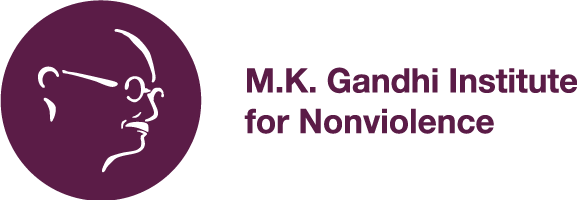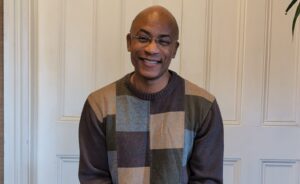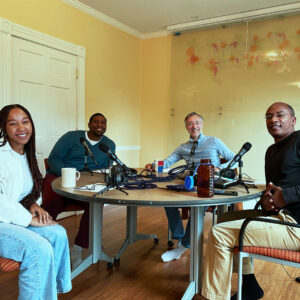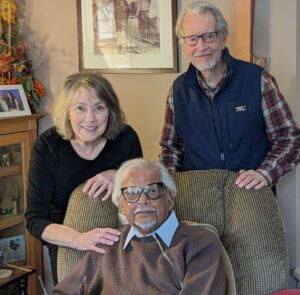 I often receive questions and comments from people who have heard something about Gandhi being a racist and asked for my thoughts. It’s easy for me to see why that perception exists. When I typed “Gandhi Racism” in Google, 493,000 hits came up (for comparison: 110 million hits come up when I entered the word Gandhi only).
I often receive questions and comments from people who have heard something about Gandhi being a racist and asked for my thoughts. It’s easy for me to see why that perception exists. When I typed “Gandhi Racism” in Google, 493,000 hits came up (for comparison: 110 million hits come up when I entered the word Gandhi only).
And yet… from visiting S Africa, I learned of Gandhi’s connection with his closest neighbor, African National Congress (ANC) founder John Dube, who established the ANC as a nonviolent organization after being influenced by conversations with Gandhi. I have spoken directly with civil rights hero Dr. Bernard Lafayette, who during his days of activism and 26 arrests proudly wore the nickname “Little Gandhi” for his depth of knowledge about Gandhi and his approach. These are the affects of Gandhi’s life on two black leaders, among many others. And while travelling in S Africa, learning about nonviolence, I heard a popular sentiment several times: ‘India gave us Mohandas, and we returned him as Mahatma’. South African leaders, most notably Nelson Mandela, have lauded him as being part of the epic battle to defeat the white regime and prepare the way for a non-racial country.
Like so many leaders, Gandhi’s history is complex. For myself, I’ve decided that I don’t need my teachers and heroes to be perfect. Nor do I blindly emulate them. I pick and choose. MLK’s systemic understanding of the ways that race, poverty and war intersect offers me, for example, a far more relevant model of understanding current social forces than Gandhi’s thinking. And still there are ways in which Gandhi’s life and thinking move me still, from his thinking on sustainability to the important of local economies to interfaith. Finally I wonder…what is it that makes us want/need our leaders to be perfect?
 After venturing to South Africa with Arun Gandhi, to learn about his grandfather’s life and legacy, the veils I placed upon the elder Gandhi’s humanity fell before my feet and the image I held of him became more vivid and clear- like watching wildflowers blossoming in Spring.Ela Gandhi, Arun’s younger sister, spoke with our traveling group about her grandfather’s disparaging sentiments toward the Black South African, which he held during his early years in South Africa. Her serene voice still rings in my head when I reminisce upon that sojourn, a voice I associate with crisp, cool water.
After venturing to South Africa with Arun Gandhi, to learn about his grandfather’s life and legacy, the veils I placed upon the elder Gandhi’s humanity fell before my feet and the image I held of him became more vivid and clear- like watching wildflowers blossoming in Spring.Ela Gandhi, Arun’s younger sister, spoke with our traveling group about her grandfather’s disparaging sentiments toward the Black South African, which he held during his early years in South Africa. Her serene voice still rings in my head when I reminisce upon that sojourn, a voice I associate with crisp, cool water.
Ela spoke with us about her grandfather’s transformation: from a man who believed Black South Africans were of little use beyond menial labor, to a man who came to understand that, to obtain true peace, justice must be waged for everyone.To be transparent, Gandhi’s sentiments toward the Black South Africans were a great source of pain and anger for me prior to my journey to South Africa. And, to a lesser extent, it still is.
However, what is more hurtful and rage-inducing is our collective unwillingness to engage with Gandhi as he was; a human, another one of us heartbreakingly beautiful and tragically flawed beings. Enmeshing Gandhi in the chains of a romanticized sainthood, as though he left the womb with such an immense dedication to the world and all beings in it, we devalue Gandhi.
Challenging one’s worldview to consider and work to alleviate the suffering of others is difficult; doing the same for a person, or group of people, one once believed less than human is excruciating.Placing Gandhi on pedestal of absolute piety is a disservice to him, as well as ourselves.
On the eve of Gandhi’s birthday, let us all take a firm look at our flaws, our prejudices, our actions that inflict violence upon ourselves and others.
As Gandhi did multiple times during his lifetime, let us all walk the arduous path of peace, justice, and transformation.
 The older I get the more I realize how short, precious and fragile life can be. Environment, genetics and lifestyle choices impact my overall health and well-being. As an African American woman parenting a growing daughter, I’m all too aware of the lack of healthcare in my community and how it leads to chronic illness and premature death in my own family and community. Illnesses related to high-blood pressure, diabetes, heart disease, breast and cervical cancer, high cholesterol, and obesity to name a few are often preventable, if detected early and lifestyle adjustments are made.
The older I get the more I realize how short, precious and fragile life can be. Environment, genetics and lifestyle choices impact my overall health and well-being. As an African American woman parenting a growing daughter, I’m all too aware of the lack of healthcare in my community and how it leads to chronic illness and premature death in my own family and community. Illnesses related to high-blood pressure, diabetes, heart disease, breast and cervical cancer, high cholesterol, and obesity to name a few are often preventable, if detected early and lifestyle adjustments are made.
This isn’t easy and sadly I’ve attended too many funerals and made too many hospital visits to strong, black women who took care of everyone else except their own health. All the money in the world can’t buy health and once it’s gone people take extraordinary measures to get it back. Prevention is key. Proper nutrition through a healthy diet with regular exercise are choices most people can tweak every day to not only extend their lives but improve their quality of life.
Although M.K. Gandhi was a non-violent activist who at times used fasting as a political strategy, throughout his life he also experimented with diet to find the healthiest and simplest ways to eat. It doesn’t sound like he consumed processed foods but consumed a diet filled with vegetables and fruits. He once said, “it is health that is the real wealth and not pieces of gold and silver.” No matter how busy his schedule was, he chose walking as his mode of transportation. This resonates with me because I live in a super-sized, microwave culture.
Yet, I can’t blame my culture for my lifestyle choices. For instance, when I make fresh vegetable and fruit juices, I know I’m infusing my body with the micro-nutrients it needs that may prevent illnesses later in life. Plus, I feel better so my quality of life is improved. The community garden at the Gandhi Institute serves as a wonderful resource for fresh produce within a community with healthcare disparities. I’m still working on being empowered not to allow the pursuit of anything, including material wealth, to overshadow my making healthier lifestyle choices. I want to live a long, healthy life. Audre Lorde said, “caring for myself is not self-indulgence, it is self-preservation, and that is an act of political warfare.”. As a mother and as an African American woman, this is the legacy that I choose to pass on to my daughter and those in my circle of influence.
 The older I get, the less I am able to identify where I end and the rest of the world begins. Thanks to advancements in science, I now know that my body is composed of more microbial cells than cells with my own DNA. I am aware that I am always mixing with and molding against my surroundings, and that every interaction with another person changes me in some way. For better or worse, it seems we are constantly leaking into one another. Gandhi’s philosophy of nonviolence utilizes this sense of oneness to push back against powerful and deeply rooted systems of oppression. His life and work spread the notion that violence against another is violence against oneself. This understanding remains imperative to enacting social change in a way that does not implicitly reproduce current systems of hierarchy and domination, but rather deconstructs the perceived “other” into a valued embodiment of shared humanity.
The older I get, the less I am able to identify where I end and the rest of the world begins. Thanks to advancements in science, I now know that my body is composed of more microbial cells than cells with my own DNA. I am aware that I am always mixing with and molding against my surroundings, and that every interaction with another person changes me in some way. For better or worse, it seems we are constantly leaking into one another. Gandhi’s philosophy of nonviolence utilizes this sense of oneness to push back against powerful and deeply rooted systems of oppression. His life and work spread the notion that violence against another is violence against oneself. This understanding remains imperative to enacting social change in a way that does not implicitly reproduce current systems of hierarchy and domination, but rather deconstructs the perceived “other” into a valued embodiment of shared humanity.
Despite its capacity to promote nonviolence, “oneness” can be dangerous if not tempered with an understanding of humanity as a collective entity composed of distinct individuals with unique experiences. Given the deep interconnectedness of human life, it can be easy for me to assume that I understand the experiences of others and therefore have the authority to judge or control their actions. Gandhi acknowledged that the novelty of each individual experience renders it incommunicable, and therefore unknowable by other people. He harbored a deep respect for each person’s viewpoint, boldly stating that “relative truth is all we know.”
By using empathetic and nonviolent means to reclaim India from British colonial powers, Gandhi proved that effective social, political, and economic change can arise from a simultaneous reverence for unity and diversity. Ultimately, Gandhi has taught me that to value diversity is to have faith in oneness. When I view people as beautiful, autonomous, and ultimately unknowable parts of myself, I can release the fear of the “other” that society has so powerfully ingrained in my thinking and truly embrace their unique and invaluable presence.
 Since Arriving at the M.K. Gandhi Institute in late August, I have been able to further understand the importance of Mahatma Gandhi and all the good he did for those he came in contact with during his life. My work at Wilson enables me to put into practice the philosophies and concepts that Gandhi preached about, such as nonviolent communication, as well as conflict resolution. There are a number of outside influences that students at Wilson have to face and it can be difficult not to bring some of those hardships with them into the school building. Being a Restorative youth educator has allowed me to reach students on a deeper level after a conflict, and ask some of the questions that their immediate teachers may not necessarily have the time to ask or deal with it. Once students settle down and highlight who has been affected by their actions, it is amazing to see how much they open up.
Since Arriving at the M.K. Gandhi Institute in late August, I have been able to further understand the importance of Mahatma Gandhi and all the good he did for those he came in contact with during his life. My work at Wilson enables me to put into practice the philosophies and concepts that Gandhi preached about, such as nonviolent communication, as well as conflict resolution. There are a number of outside influences that students at Wilson have to face and it can be difficult not to bring some of those hardships with them into the school building. Being a Restorative youth educator has allowed me to reach students on a deeper level after a conflict, and ask some of the questions that their immediate teachers may not necessarily have the time to ask or deal with it. Once students settle down and highlight who has been affected by their actions, it is amazing to see how much they open up.
Gandhi believed that violence oftentimes begets violence, unless another voice of reason can intervene and present ways in which others can better handle conflict so everyone involved can coexist with one another. I take pride in being that person who young people feel comfortable coming to whenever conflict arises, and offering solutions as to how they can have more peaceful days whether it is with other students or staff members.
As the year progresses, I will continue to be inspired by Gandhi’s work and search for different ways that I can implement his practices by doing Restorative Justice. It is amazing to think that I have already been at the Institute for over a month but with the help of dedicated colleagues and support from the Rochester City School District, we are able to participate in Wilson High School’s pre-established restorative processes.




